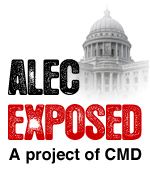Submitted by Lisa Graves on
This CMD Special Report cuts through the PR spin and exposes the funding and spending of the American Legislative Exchange Council (ALEC). Almost 98% of ALEC's funding comes from corporations like Exxon Mobil, corporate "foundations" like the Charles G. Koch Charitable Foundation, or trade associations like the pharmaceutical industry's PhRMA and sources other than "legislative dues." Those funds help subsidize legislators' trips to ALEC meetings, where they are wined, dined, and handed "model" legislation to make law in their state. Through ALEC, corporations vote on "model" legislation with politicians behind closed doors. The special report focuses on ALEC's funding. Learn more at ALEC Exposed.
Legislative Dues or Corporate Coffers?
 Almost 98% of ALEC's cash is from sources other than legislative dues, such as corporations, trade associations, and corporate foundations. ALEC describes itself as the largest "membership association of state legislators," but only a little more than ten percent of its funding comes from legislative dues. Some of the biggest corporations in the world bankroll and thus subsidize the activities of the legislators who are part of ALEC. Corporations provide general support that covers the annual ALEC conventions -- which are summer trips of politicians and their families to resorts for the annual ALEC meeting -- and the preparation of "model" bills and glossy promotional materials. ALEC could actually be called one of the most powerful membership associations of corporations attempting to influence state legislators. But ALEC's tax filings do not even count corporate donations as membership dues; they are listed under gifts.
Almost 98% of ALEC's cash is from sources other than legislative dues, such as corporations, trade associations, and corporate foundations. ALEC describes itself as the largest "membership association of state legislators," but only a little more than ten percent of its funding comes from legislative dues. Some of the biggest corporations in the world bankroll and thus subsidize the activities of the legislators who are part of ALEC. Corporations provide general support that covers the annual ALEC conventions -- which are summer trips of politicians and their families to resorts for the annual ALEC meeting -- and the preparation of "model" bills and glossy promotional materials. ALEC could actually be called one of the most powerful membership associations of corporations attempting to influence state legislators. But ALEC's tax filings do not even count corporate donations as membership dues; they are listed under gifts.
Just One Percent from Legislative Dues?
Yes. According to ALEC's IRS filings, over the past three years it has raised $21,615,465 from corporations, foundations, and other sources, and just over $250,000 in dues paid by state legislators, amounting to slightly more than 1 percent of its income. The gigantic gap between what legislators pay and what ALEC spends is the direct result of the reality that legislators pay a mere $50 a year to be a member, while a corporation can pay up to $25,000 a year or more to be a member of ALEC plus additional fees to be on a task force where corporations get the same right to vote as legislators. They just pay hundreds of times more for that vote.
What Does 2% Even Buy?
Not much. ALEC legislative dues really amount to window dressing. Take 2009, for example. That year, legislative dues came to $82,891, and all the corporate tax-free donations and other income amounted to $6.1 million. Legislative dues barely would cover ALEC's own pension plan, and they did not cover even half of the compensation of ALEC's executive director that year (which was $189,833, not counting his severance pay of an additional $54,615). ALEC wrote off more bad debts ($100,000) than it received from legislative dues in 2009.
Who Pays More than Legislators?
Everyone else. For example, the foundations controlled by the billionaire Koch brothers gave ALEC over $200,000 in 2009. (The Claude R. Lambe Foundation, which Charles Koch, his wife and kids help run, donated $125,000 to ALEC. His own Charles G. Koch foundation kicked in an additional $75,000.) That $200k is before whatever is the undisclosed amount of membership "dues" paid by Koch Industries, which is run by Charles and David Koch. There is no public disclosure of annual gifts the company gives to take part in the one-stop shopping ALEC conventions provide to meet with legislators from every state about their wish list.
Is that All the Kochs Have Done with ALEC?
No, there's more. In 2009, Koch corporate and foundation gifts likely amounted to about three times more income for ALEC than the dues from all of its legislative members combined. Research from CMD and GreenPeace documents that the Koch foundations have given ALEC at least $600,000 in the past decade or so, and Koch Industries has donated an untold amount. The Kochs also bailed out ALEC with a loan of nearly half a million dollars in the late 1990s. Koch Industries has also chaired ALEC's corporate board and has had a seat on its board for over a decade. Plus, another subsidy unaccounted for by ALEC is the money corporations like Koch have spent on having the head of its lobbying arm involved in ALEC's leadership as well as whatever amount of time the company spends crafting ALEC "model" legislation.
The Charles G. Koch Foundation also funds Koch interns and fellows who have worked for ALEC, and Koch foundation "experts" have also provided help, such as analysis attacking the pay of public state employees. And ALEC's Board of "Scholars" includes people who also receive Koch funding or are work for Koch-funded groups. Beyond all that, the Kochs have funded an infrastructure to support their agenda, through funding other groups like Americans for Prosperity (founded by David Koch), which push legislative proposals echoing the ALEC agenda, on climate and countless other issues
Is It Just a Koch thing?
No. Other right-wing foundations have also supported ALEC, far beyond the "dues" paid by any legislator. For example, the Castle Rock Foundation, which is run by right-wing beer heir Peter Coors, gave $50,000 last year and in prior years. The right-wing John M. Olin foundation has also been a donor to ALEC. Another of the big right-wing foundations, the Lynde and Harry Bradley Foundation, has been a funder and, for example, gave ALEC $50,000 in 2009 to fund "budget reform" work. Similarly, right-winger Richard Scaife has given ALEC over half a million dollars the past decade or so, through his Allegheny Foundation. Some of the organizations that support ALEC, like Scaife's, are also deeply invested in the profits of corporations that sit on ALEC's board. The Allegheny Foundation has held over $11 million of ALEC board member Altria's stock, along with major stock holdings in other ALEC corporate board members like Kraft, Coca Cola, AT&T, GlaxoSmithKline, Johnson & Johnson, and Exxon.
Who Else Gives to ALEC?
Many global corporations and trade associations. ALEC claims to have over 300 corporate "members," and each pay between $7,000 and $25,000 or more to be members, plus fees to have a vote on a task force and for other sponsorships. The names of all of these entities is not known. We do know that the American Petroleum Institute, a trade group that aids the largest companies in the world like Koch and Exxon, gave ALEC $50,000 last year. And, as GreenPeace has documented through public filings, the Exxon corporation and its foundation have given a combined total to ALEC in the past decade or so of over $1.4 million. Other current ALEC corporate leaders have given an undisclosed sum to ALEC this year and before.
These companies include: CenterPoint 360 (a firm that helps companies "manage legislation"), Altria (formerly Phillip Morris tobacco), the American Bail Coalition (the trade group for for-profit bail bonds), AT&T, Bayer (aspirin), Coca-Cola, Diageo (Crown Royal and other liquor), Energy Future Holdings (Texas electricity), ExxonMobil, GlaxoSmithKline (Tums and other brands), Intuit (Quickbooks), Johnson & Johnson (lotion), Koch Industries (Georgia Pacific paper products and other brands), Kraft Food (Macaroni and Cheese dinners), Peabody Energy (the largest private coal company in the world), Pfizer (Viagra), PhRMA (the pharmaceutical trade group), Reed Elsevier (Lexis/Nexis legal research), Reynolds American (tobacco), Salt River Project (energy), State Farm Insurance, United Parcel Service, and Wal-Mart (world's largest retailer).
Where Do Donations from Corporations or Corporate Foundations Go?
 For one, they help subsidize legislators' trips to attend ALEC meetings. ALEC has reported to the IRS that it has liabilities of about one million dollars a year for "scholarship funds." These are not scholarships for kids who do well in school; they are financial gifts called "scholarships" to help cover the costs of the family vacations that legislators and their families take to ALEC conventions at resorts every August, after their state legislative sessions end. For these conventions, legislative members are charged a registration fee that is substantially less than what corporate members pay. Some undisclosed number of legislators have their airfare and hotel costs for trips to these posh hotels paid by ALEC. As part of the registration process, legislators can arrange for childcare, which ALEC dubs "Kids Congress," for six-month old babies to teens for $250. ALEC reports that it has spent over $250,000 for childcare for meetings in 2009.
For one, they help subsidize legislators' trips to attend ALEC meetings. ALEC has reported to the IRS that it has liabilities of about one million dollars a year for "scholarship funds." These are not scholarships for kids who do well in school; they are financial gifts called "scholarships" to help cover the costs of the family vacations that legislators and their families take to ALEC conventions at resorts every August, after their state legislative sessions end. For these conventions, legislative members are charged a registration fee that is substantially less than what corporate members pay. Some undisclosed number of legislators have their airfare and hotel costs for trips to these posh hotels paid by ALEC. As part of the registration process, legislators can arrange for childcare, which ALEC dubs "Kids Congress," for six-month old babies to teens for $250. ALEC reports that it has spent over $250,000 for childcare for meetings in 2009.
ALEC also spends about $600,000 a year on what it describes as the "recruitment and retention of ALEC State Legislator members." For an organization that claims such devotion to the free market, it is difficult to imagine an ordinary business justification for spending $600,000 to recruit and retain legislative members who only contribute about $80,000 a year in income to ALEC. But plainly, such a lop-sided loss must be covered by other returns on investment. Indeed, ALEC brags about how over 1,000 of its model bills get introduced in statehouses each year, but sticks to its claim that its bill factory does not count as "lobbying."
ALEC's corporate "state chairs" -- companies whose identities are not publicly disclosed by ALEC -- are expected to raise "state scholarship funds" for state legislators to attend ALEC conventions. ALEC's by-laws from 2007 also provide that the legislators who serve as state chairmen have a "duty" to work with the corporate state chairmen "to raise and oversee expenditures of legislative scholarship funds." In other words, select corporations work directly with legislators to raise money from other corporations to subsidize trips for legislators to ALEC events. State chairmen are also tasked with "working to ensure introduction of model legislation." The scholarship funds are apparently essential to ALEC's operations, because most state legislators work as public servants part-time and earn, on average, about $46,000 a year. Without ALEC's subsidy, not as many of them would likely be willing or able to use the ALEC convention as a family trip. But ALEC membership does provide other rewards for legislators. It allows them to rub elbows with rich, out-of-state potential donors to their election campaigns and also to build similar relationships with ALEC's state corporate members.
How Much Do These ALEC Conventions Cost?
ALEC conventions cost about $2 million a year, but only bring in about $850,000 in revenue. Again, for an organization that talks about government as inferior to the wisdom of the corporate bottom line, it spends a great deal of money losing money, year in and year out, on conventions. ALEC conventions are not close to break-even operations, financially, but they are a bonanza for marrying state legislators with the wealthy captains of industry (and their lobbyists) at luncheons, dinners, golf outings, skeet shooting, boat rides, cigar smoking parties, and other events to help politicians and corporations bond. The conventions also provide ALEC with a vehicle to indoctrinate legislators with so-called "experts" on issues related to ALEC's model legislation. Many of these experts are funded by the same group of right-wing corporate foundations that fund ALEC. Even though the ALEC meetings are a losing proposition financially, ALEC spends almost a quarter of a million dollars on the audio-video for its well-heeled audience, pays fees (honoraria) to some speakers, and spends thousands on awards for corporate CEOs, politicians, and journalists.
What Else Does ALEC Do with the Corporate Money?
 It spends about $2.5 million a year on its "task forces." ALEC describes its role as providing a forum for legislators and the private sector to discuss model legislation. Many of the corporate representatives on these task forces are lobbyists for their companies, who are discussing their legislative wish lists with politicians through ALEC's facilitation. ALEC has stated that because actual "laws are not passed, debated or adopted during this process," "therefore no lobbying takes place. That process is done at the state legislatures." Yet ALEC is spending millions of dollars to ensure that corporate wish lists get in the hands of legislators, that the legislators vote for the legislation behind closed doors through ALEC, as do corporations, and then that the politicians who are leaders of ALEC introduce those very bills and get them made into law. ALEC then heralds the introduction and enactment of this legislation that was advanced through the enormous corporation donations it receives. As the documents revealed by ALEC Exposed show, ALEC calls its role in the state legislative process "unique" and "unparalleled." As ALECexposed.org demonstrates, it is also deeply troubling.
It spends about $2.5 million a year on its "task forces." ALEC describes its role as providing a forum for legislators and the private sector to discuss model legislation. Many of the corporate representatives on these task forces are lobbyists for their companies, who are discussing their legislative wish lists with politicians through ALEC's facilitation. ALEC has stated that because actual "laws are not passed, debated or adopted during this process," "therefore no lobbying takes place. That process is done at the state legislatures." Yet ALEC is spending millions of dollars to ensure that corporate wish lists get in the hands of legislators, that the legislators vote for the legislation behind closed doors through ALEC, as do corporations, and then that the politicians who are leaders of ALEC introduce those very bills and get them made into law. ALEC then heralds the introduction and enactment of this legislation that was advanced through the enormous corporation donations it receives. As the documents revealed by ALEC Exposed show, ALEC calls its role in the state legislative process "unique" and "unparalleled." As ALECexposed.org demonstrates, it is also deeply troubling.


Comments
Lauren J replied on Permalink
ALEC
George W. replied on Permalink
Which laws?
Anonymous replied on Permalink
"mainstream media outlets and not even PBS has followed up with
former alec member replied on Permalink
National Council of State Legislators
Lisa Graves replied on Permalink
NCSL
Aldo replied on Permalink
Thank you for following up
Anonymous replied on Permalink
Bilderberg
Anonymous replied on Permalink
ALEC
G'ma K replied on Permalink
Who is it?
John Galt replied on Permalink
Media
Pages